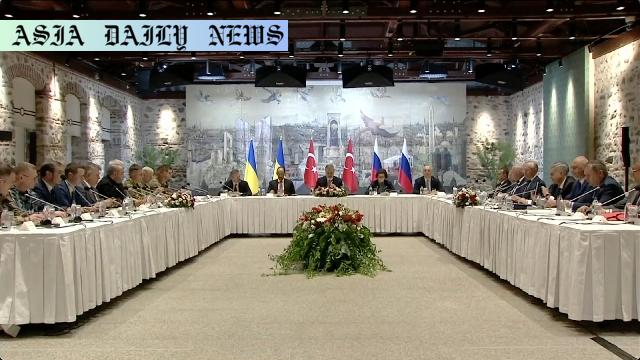Prisoner Swap: Russia and Ukraine agree to exchange 1,000 POWs each during direct talks in Istanbul, but no ceasefire deal yet.

Overview of the Prisoner Swap Agreement
The recent direct talks between Russia and Ukraine mark a significant step forward in efforts to manage the ongoing crisis. This meeting, held in Istanbul, witnessed a positive outcome as both nations agreed upon a prisoner swap. Under the agreement, 1,000 prisoners of war (POWs) from each side are to be released, offering a moment of humanitarian relief amid an otherwise grim conflict.
The negotiations were led by senior Russian official Vladimir Medinsky and Ukrainian Defence Minister Rustem Umerov. Medinsky expressed satisfaction with the outcomes, emphasizing Moscow’s readiness for continued discussions. Umerov, on the other hand, indicated Kyiv’s hope to escalate talks to a leadership-level summit, a goal President Volodymyr Zelenskyy has publicly pursued. Despite this tangible progress, the lack of a ceasefire agreement highlights the enduring challenges in reaching a comprehensive resolution.
Mediation and International Involvement
The meeting in Istanbul also underlines Turkey’s pivotal role in facilitating diplomacy. Turkish Foreign Minister Hakan Fidan participated as a mediator, offering Turkey’s neutral platform to bridge divides between the two sides. This role reaffirms Turkey’s growing influence in navigating complex geopolitical crises and its commitment to regional stability. Fidan’s involvement was critical in ensuring a level-headed and structured dialogue during the talks. However, mediators acknowledged the wide gaps that still exist between Moscow and Kyiv’s positions, particularly concerning long-term goals like ceasefire agreements and territorial disputes
Challenges Ahead in Resolving the Conflict
Despite the encouraging development surrounding the prisoner exchange, the broader conflict remains mired in uncertainty. Russia’s reluctance to entertain the idea of a summit between Zelenskyy and Putin is telling of the lingering mistrust and intractable issues such as territorial occupation and military aggression. Ceasefire negotiations remain out of reach, owing to both countries’ unwillingness to compromise on key terms. Furthermore, the humanitarian crisis continues to escalate, further emphasizing the necessity for an enduring resolution. The prisoner swap, while remarkable, serves as a reminder of the complexities involved in conflict resolution. It is a critical moment, but only one step in a series of laborious negotiations required to achieve lasting peace.
The Broader Implications of Diplomacy
Although the agreement to exchange prisoners represents a glimmer of hope, it also highlights the complexity of achieving sustainable peace in the region. The lack of a ceasefire deal underscores the ongoing discord and conflicting agendas that characterize this conflict. Yet, the willingness of both parties to sit at the negotiation table offers a shred of optimism. Future rounds of discussions may pave the way for meaningful breakthroughs, especially if international mediators like Turkey can sustain and enhance their roles. The global community closely watches this process, hoping for a resolution that prioritizes the humanitarian needs of individuals caught amidst the war’s devastation.
Commentary
Hope Amidst Conflict: Examining the Prisoner Swap Agreement
The recent agreement between Russia and Ukraine to exchange prisoners is a hopeful milestone in a conflict full of despair and uncertainty. This moment reminds us that even the most fraught situations can offer glimpses of humanity and collaboration. Releasing 1,000 POWs on each side not only reunites individuals with their families but also symbolizes a potential shift in diplomatic efforts. The presence of Turkish Foreign Minister Hakan Fidan as a mediator reinforces the importance of third-party involvement in navigating tense international ties.
Challenges Loom Large in Ceasefire Talks
Still, as encouraging as the prisoner swap may be, this development should not obscure the persisting hurdles in achieving peace. The lack of progress toward a ceasefire agreement highlights the deep fissures between the two nations’ goals and agendas. Each side remains steadfast in its demands, making it difficult to envision an immediate resolution. Furthermore, the absence of a broader blueprint addressing key issues such as territorial disputes weakens the potential for substantive breakthroughs. Without sustained dialogue and international support, these challenges could easily overshadow steps toward peace.
The Role of Global Actors in Paving the Pathway to Peace
This situation underscores the critical role of mediators like Turkey in facilitating dialogue. Turkey’s neutral platform provided a space for open discussions, and its willingness to support both sides should be commended. However, the global community must intensify its involvement. Diplomatic initiatives must go beyond incremental agreements such as prisoner exchanges and actively work toward tackling the root causes of this conflict. Only then can true progress be achieved, ensuring long-term stability in a region yearning for peace.
Ultimately, the prisoner swap is a hopeful example of what can be achieved when dialogue is prioritized. While challenges remain significant, small milestones like these are essential stepping stones toward a broader resolution.


